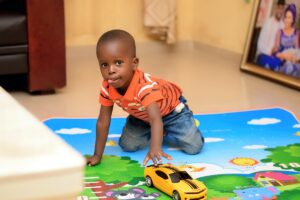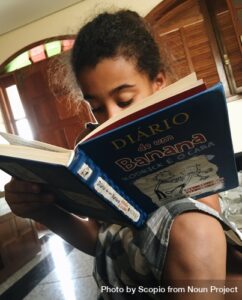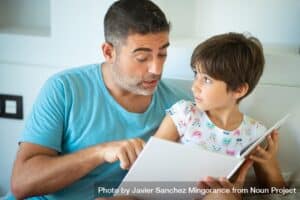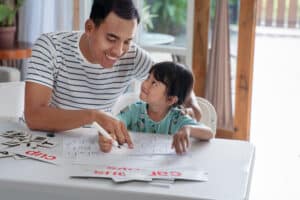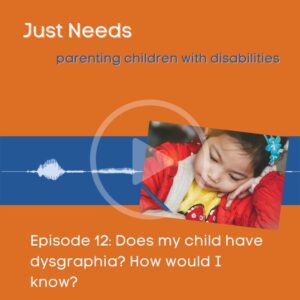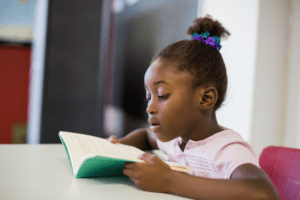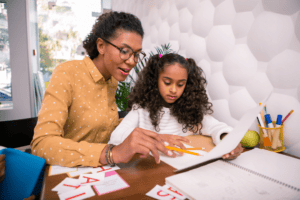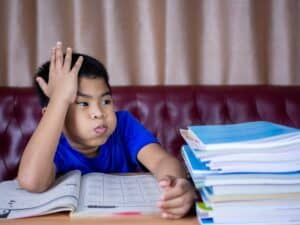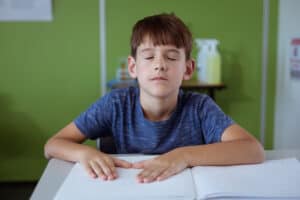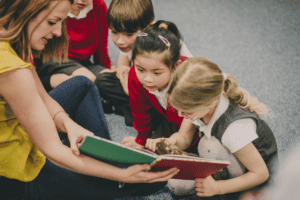How To Improve My Child's Reading and Writing Skills
Have you noticed your child struggling with reading and/or writing skills? Helping your child improve their literacy skills can be difficult without the right resources and information. Let’s take a look at some of the resources you and your child can benefit from!

How to Improve My Child's Reading and Writing Skills: Getting The Right Resources
By offering easy-to-follow information, advocacy and skill-building tools, and connections to other caregivers, Exceptional Lives provides families, caregivers, and professionals the level of support and compassion necessary to see your children thrive in an educational environment.
What Resources Can Help My Child’s Literacy Skills? What Are The First Steps?
We know that for your child, improving literacy skills can be a long and difficult task. We also know it’s difficult as parents to try and guide our children to improvement without any resources or support. So we end up asking ourselves: “how do I improve my child’s reading and writing skills?”
Since every child is different and has different challenges, it’s important to think about their specific needs when you’re looking for resources.
The first step to helping improve your child’s literacy skills is recognizing where they might be struggling. To help identify your child’s trouble spots specifically, we’ve broken down the components of literacy for you:
- Phonics and Decoding – Phonics is understanding how letters represent sounds. Decoding is using that knowledge to “sound out” words.
- Fluency – The ability to read smoothly and accurately, with expression.
- Vocabulary – The words a person knows.
- Comprehension – Understanding what the text is saying.
- Writing – Putting ideas into words in print.
If you suspect that your child is struggling with reading and writing, here are the first steps:
- Explore your concerns with your child’s teacher (if they are not yet in school, talk to your doctor)
- Ask the school to do an evaluation for your child so you can better understand why they are struggling
- Identify ways to support your child in making progress at school and at home
Has your child benefitted from resources in the past but now something isn’t working? Here is how to help them get back on track:
- Let the IEP team (if your child has one) or your child’s teacher know about your concerns. Trouble spots can change over time. Third grade is a time when many students begin to struggle with reading and writing.
- Ask for an IEP meeting (you don’t have to wait for your annual meeting) so you and the team can decide what may need to change.
- Track your child’s progress with the new services and accommodations to see if the approach is helping.
Is your child getting ready to finish high school? Here are the first steps to help them prepare for life after high school:
- Get in contact with the Office of Disability Services (different colleges may have different names for this) at your child’s college and ask them how to get your child registered.
- Explore approaches for your child to tackle reading and writing on their own.
- Ensure you have all your student’s paperwork and that all of it is up to date.
Step-By-Step Guides
What is Literacy and What Are Reading and Writing Disabilities?
The ultimate goal of reading is for a person to understand and get meaning from what they read. When a child has a literacy-related disability it is more difficult for them to fully understand the material.
So how can I tell if my child is struggling with literacy? With some kids, it’s easier to tell than others. With each grade level a student is expected to improve their literacy skills, but ultimately every student will have their own strengths and weaknesses. Resources like Great Schools provide videos and informative directories of what literacy skills are to be expected for a student in each grade level.
Whether you are just finding out about your child’s trouble with literacy skills or you’ve been at the journey for a while, there are resources to benefit you and your child in school and at home.
Understanding Two Common Learning Disabilities: Dyslexia and Dysgraphia
These disabilities do not have anything to do with a person’s intelligence. They are caused by differences in the brain and they affect the way the brain processes information.
Dyslexia is a common disability that affects 5-10% of people. It is a language based learning difference that affects a person’s ability to connect letters to sounds, making it hard to read and spell. A person with dyslexia will read below what would be expected despite having normal or even above average intelligence. Learn more about dyslexia.
Dysgraphia affects 5-20% of people. Many people suffering from dysgraphia will go their whole lives undiagnosed. Dysgraphia is a neurological disorder of written expression that impairs writing ability and fine motor skills. It is a learning disability that affects children and adults, and interferes with practically all aspects of the writing process. Learn more about dysgraphia.
Search our Disability Services Finder for Louisiana (en español) or Massachusetts (en español) to find reading and writing support and other kinds of disability-related services in your area.
Is your child struggling with literacy skills?
Here are some resources to help you out!
Does your child have a new diagnosis of a reading or writing disability?
Here are some resources to help you out!
Does your child have support in place but they are still struggling?
Here are some resources to help you out!
Is your child struggling with literacy skills and getting ready to finish high school?
Here are some resources to help you out!
Response to intervention (RTI)
A system of trying different teaching strategies, or interventions, to help a child who is struggling in school before referring them for special education services. There are different levels that increase in intensity. When a lower-level strategy doesn’t work, the school will try the next level. If these do not help a child make progress, the next step is to get a special education evaluation. More about RTI.
Fluency
Fluency is the ability to read smoothly and accurately, with expression. It is a key component of literacy and a necessary skill for understanding what you read. More about fluency and other literacy components.
Grade-Level Expectations
Students are expected to have certain skills and knowledge in each grade, and these build on each other throughout the school years. States have their own standards of what skills and knowledge students in each grade should have. School assessments during each year track students’ performance to see if they are still at grade level. More about grade-level expectations.
Parent Perspectives: How To Improve My Child's Reading and Writing Skills
Know that you are not alone in this journey! By hearing from other parents and providers caring for children with disabilities you can learn from other’s experiences and thoughts. Learn how they navigate their own challenges in our webinars, podcasts, and blogs that present various resources and topics for more information about Special Education.
Is your child struggling with literacy skills?
Here are some resources to help you out!
One Quick Question: What are the components of literacy?
How do children learn to read? Watch this 2-minute video about the most important early reading skills and how you can help your child gain those skills.

Does my child have dysgraphia? How would I know?
Dysgraphia is a learning disability that interferes with a person’s ability to express their ideas in writing. But you may not even know what it is. Here’s what to look for and what to do if your child is struggling. Narrated by Christina Kozik; Written by Julie McIsaac

My Child is Struggling with Reading…Could it be DYSLEXIA?
Dyslexia is the most common learning disability but it often goes undiagnosed. In this blog we talk about the warning signs and how to get a diagnosis.

Literacy FAQ: How do I help my child learn to read? (video)
This 2-minute video discusses the different parts of literacy, how the parts work together, and how you can help your child learn to read.

Is your child struggling with reading? Here are 5 ways you can help at home.
Many children have trouble with reading and literacy. But there are ways you can help at home! See these 5 tips on how to help if your child struggles with reading.

Does your child have a new diagnosis of a reading or writing disability?
Here are some resources to help you out!
One Quick Question: How can the school help if my child is having trouble reading?
If your child is having trouble reading, their school can help. Watch this video to see how.

Literacy FAQ: What can the school do to help if my child is struggling with reading? (Video)
Watch this 2-minute video for tips on how to partner with your child’s school to help your child that may be struggling with reading.

One Quick Question: How do I help my struggling reader?
Watch this 2-minute video from a literacy expert on how to help your child struggling with reading skills such as identifying the areas of challenge.

Does your child have support in place but they are still struggling?
Here are some resources to help you out!
What is Response to Intervention (RTI) and how can it help if my child struggles in school?
Response to intervention is a system schools use to help students who are struggling. If your child has a disability, RTI may help. Here’s what you should know.

Literacy FAQ: Where do I start to help my child catch up with reading skills? (video)
Watch this 2-minute video to learn some ways to help your child catch up with reading skills.

Is your child struggling with reading? 6 ways their school can help
Many children have reading problems in the early grades, but schools have strategies to help. See these 6 ways the school can help a child struggling with reading.

Is your child struggling with literacy skills and getting ready to finish high school?
Here are some resources to help you out!
How can I get my teenager ready for independent living?
The transition to adulthood is hard. For kids with disabilities, it can bring extra challenges. In this podcast we talk about how to help our kids get ready.Narrated by Christina Kozik; Written by Julie McKinney

Prepare your child for the workforce with job skills training for young adults with disabilities.
What job skills do employers look for? Prepare your child for the workforce with job skills training for young adults with disabilities.

1 Quick Question: How can I help my child with a disability get ready to transition to college?
If your child with disabilities is getting ready for college, you may be wondering what skills they need. This 2-minute video with advice from Fred Johnson of Collegiate Academies in New Orleans will point you and your student in the right direction.

Frequently Asked Questions on how to improve my child's reading and writing skills
Realizing your child needs some extra help with reading can be overwhelming. Don't worry, we have your back! Here's some of the questions parents ask us most often about reading and writing.
Need more help? Click the button below to chat with an Exceptional Lives expert.
Tests for dyslexia are neurological tests. They look at skills related to reading, such as decoding, phonological awareness, and comprehension. Doctors also look at all of the test results to identify your child’s specific challenges with reading to determine whether they have dyslexia.
Reading can be frustrating for a child who is struggling. Getting them to read can be extremely difficult but there are ways to get the process going. Try to help your child associate reading with happy, relaxed family time, and not just stressful moments in school. Frequent casual reading times where you help or share in the reading as much as they need can create a less stressful environment for them. Also, following your child’s interests and abilities can get them more interested in reading: include things like recipes, street signs, toy instructions, or comics. Here are 5 ways to help your child at home.
Teach your child about STAR. STAR stands for:
- Smile
- Take a deep breath
- Relax
Teaching your child relaxation techniques can help relieve some of their tension. To learn more about these techniques, watch this short video from John-Pierre LaFleur, M.Ed., a school counselor at East Baton Rouge Parish School System. Learn more about how the school can help your child with reading and writing.
Implementing games into reading can help their association with reading. Lastly, try talking to their teacher to see what accommodations can be made to help your child feel comfortable and excited to learn.
Louisiana Believes has practice tests for LEAP that you and your child can go through for preparation.
Pearson Support has practice tests for MCAS that cover English Language Arts that you and your child can go through for preparation

